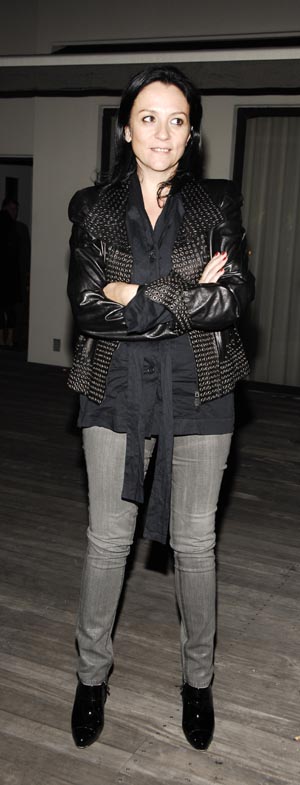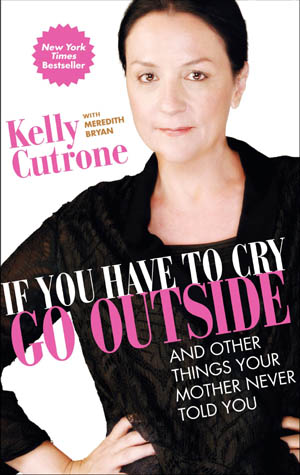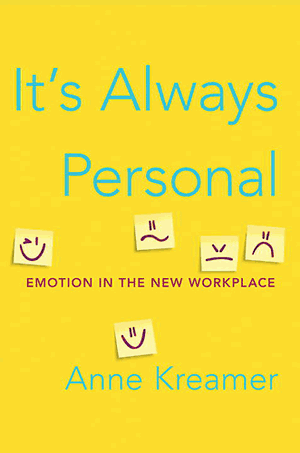|
WHEN A WOMAN CRIES in public, even
against her best intentions to remain cool under pressure, it unleashes
negative stereotypes—even in 2011. However, when powerful men such
as House Speaker John Boehner, Glenn Beck and championship-winning
athletes unleash the waterworks, it makes news.
In fact, these incidents, plus well publicized research
conducted by Kim Elsbach, a professor of management at the University
of California–Davis published in Forbes last February has
tapped into, well, a wellspring of interest on the subject of crying.
While prominent women like Hillary Clinton and Nancy Pelosi often
get criticized for their ‘unfeminine’ emotional restraint, crying
on the job is just shy of being a career killer in many professional
settings.
As a generation of women ascends the success ladder,
one part of the price involves our going against our natural tendency
to show emotion even when things are at their worst. However, nature
often gets the best of many of us.
Kelly Cutrone is one of America’s most visible examples
of strength under pressure. On the heels of building People’s Revolution,
one of the most influential lifestyle public relations firms in
the country (whose alumni include Philadelphia-bred Eileen Colavita
and her respected Hollywood PR agency,
Spin Shoppe, as well as bi-coastal US
fashion & beauty firm Kravetz PR,
among many others), Cutrone—through a decidedly non-sugar-coated
approach has become a role model for women interested in making
it in PR and other cut-throat glamour professions.
Her mindset has been channelled into New York Times
best seller If
You Have to Cry, Go Outside—and Other Things Your Mother Never Told
You (paperback, US$8·57
at Amazon.com). One of her sure-fire remedies for preventing
on-the-job outbursts revolves building your strength from the inside
out, with chapters on ‘finding your tribe’ (‘like-minded souls who
make your heart sing’), transforming a setback into a creative or
financial breakthrough, accepting that there is no such thing as
perfection, creating a personal brand, and how you have to ‘fake
it to make it’ sometimes.
‘Though other topics [about succeeding in business]
are covered in the book, I realized I made a very big statement
about how I feel about crying at work with the title of my book,’
Cutrone admits. ‘Even if you have sensitivities and somebody or
something has pushed your buttons, the office and the public space
is not the place to let it all hang out and be over-emotional. If
you think about it, [the backlash from] crying adds to the burden
of the situation you are already facing. Ultimately, the solution
is simple—take it outside—not the cubicle or any other public space.’
Cutrone will also admit she had her moments of emotion,
though she treats those mistakes as teaching tools for herself and
her own employees, intended to make all involved stronger and less
inclined to do it again. Looking back over her own career, she acknowledges
some of her own non-professional responses to things early on, or
witnessed her co-workers making their own emotional lapses of judgement.
‘After a while, we cannot go on feeling sorry for ourselves
or crying, or venting about how we are under-appreciated or abused,’
asserts Cutrone. ‘We all have to accept at some point that the worlds
of business and entrepreneurship are not always going to be politically
correct. The focus has to be the well-being of your business. There
is also the fact that everybody you work with—even the nicest people—are
in it for themselves. If you have five co-workers, and you let your
guard down before promotion time, chances are (somebody) will use
that as a weakness against you. From the boss’s standpoint, if you
have five employees who are all performing well and reaching those
results, guess what comes into play next? Manners, dress code and
professionalism. If you show too much emotion in any direction,
it is overload for a manager making those decisions.’
Cutrone likens most corporate environments to the television
show Survivor, with different alliances playing against each
other.
‘One misstep and it could cost you clients, thousands
or hundreds of thousands of dollars, and ultimately your job,’ she
continues. ‘You don’t see guys crying on the field in the Super
Bowl when concentration and being on top of one’s game matters,
only tears of gratitude when they have taken the trophy. Corporations
really are like families. If you are in a managerial or leadership
role, your people look to you to set the tone and standards for
everything the office does collectively. You want your staff to
feel empowered in terms of what they can accomplish on their own
and as a team.’
Ellen Pober Rittberg, parenting expert, attorney and
author of 35
Things Your Teen Won’t Tell You, So I Will, had been put
through her paces on the job, and has much to say on the subject.
‘The times they are a-changing, but nevertheless sometimes some
women need a little help in this area to train themselves not to
cry,’ Pober Rittberg points out, through two “watershed”
experiences in her earlier life.
‘When I worked for [one] newspaper, I was informed
when I started by a co-worker that one woman editor prided herself
on making each and every female employee cry. I observed she blindside
the unwitting woman with an unfair and extreme statement. I resolved
not to allow her to make me cry, and she didn’t. However, she said
something so horrible, that I fast realized that lady’s room served
another purpose. When I was a new attorney 20 years ago, I
burst out silently crying when a custodial grandmother
said something so extreme, it shocked me. Fortunately, the only
people in the room were the judge and court officers. From that
time forward, I resolved not to ever allow myself to cry in
public at work.’
Though Pober Rittberg works many cases that strike
the heart and soul deeply, she insists keeping emotions in check
in the workplace is the only way one can hold on to her dignity,
self-respect and the respect of others.
Elsbach’s three-year study about crying in the workplace
reinforces Pober Rittberg’s advice. According to her research, women
are much more likely to cry at work because of the way they are
socialized as girls—in contrast to the way boys are conditioned
not to cry. Unfortunately, the nature and nurture that shape women,
even with strong female role models, sends them to the adult career
playing field with a clear disadvantage. One slip (especially in
a public meeting or during an office’s most stressful work season),
and your tears will be rewarded with disdain and harsh consequences.
Anne Kreamer, meanwhile, sheds more insight on the
subject in her book, It’s
Always Personal: Emotion in the New Workplace (US$15·51
at Amazon.com). It documents that 41 per cent of women surveyed
said they have cried at work, compared with just 9 per cent of men.
All of those same women expressed they wish they hadn’t. Additionally,
because women are often embarrassed when the tears come, they are
also the most critical of workplace weeping by other women.
New York-based executive recruiter Patricia H. Lenkov
also acknowledges that the way young women are raised puts them
at a disadvantage. However, she believes the way to triumph over
the nature and nurture is to understand the unwritten rules of business
conduct. While they don’t have to shut out their emotions, there
are appropriate times and places to express them.
‘While it is healthy to cry at home or go to the gym
and get it all out, the expectation is that when you step through
the door into the workplace, you are there to be a professional
and keep it together,’ says Lenkov. ‘When you cry at work, you make
people uncomfortable and their perception of your being a leader
and making good judgements is compromised. You cross a barrier that
should not be crossed because people cannot deal with it from the
other side. They are not trained to comfort you, as handling other
people’s crying is not part of most job descriptions.’
Lenkov also points out, as do many books on the subject
that there are all sorts of anti-stress techniques that we can use
to put our best face forward at work—the one without the tears.
These include such common sense measures as taking a short walk,
closing the office door for a moment of privacy and asking the person
on the other end of a conflict if the topic can be discussed at
a later time. However, coaching or counselling is emerging as one
of the best, most customizable options.
‘The field of counselling has exploded in the last
five years or so, and you have to be careful and shop around for
the right coach,’ notes Lenkov. However, there are professionals
with advanced credentials and Ph.D.s who are expert in developing
personally specific strategies to cope with stresses unique to one’s
job and workplace. It is a great option that wasn’t around 20 or
even 10 years ago. We can always use better tools for our workplace
“toolkits” to adapt to new pressures as they arise.’
While Sharon Melnick, Ph.D., a national expert on success
under stress in the workplace, acknowledges the importance of retraining
ourselves to be our best at work, she points out the physiological
reality that a women's tendency to cry is an adaptive response that
her body is set up to do in order to process emotions and move past
them. Men, meanwhile, have a low level of the hormone that sets
women up to have that response, which is why some experts say women
are ‘buffered’ from stress.
Even with our bodies calling the shots, Melnick adds
any person who wants to be a leader must be able think clearly and
decisively in situations and not take things personally.
Advises Melnick, ‘Two key skills [are] maintaining
objectivity and not reading into situations for their personal meaning.
Furthermore, both men and women can benefit from a three-part breathing
exercise that balances the nervous system and makes businesspeople
less reactive and more steady in the face of stress. Here,
you breathe in through your nose, hold, and exhale all for equal
counts. Doing this ensures you have the focus to work at your
highest capacity when you have a high volume of work, while
refuelling your energy, accessing your creative thinking and intuition,
and maintaining poise.’ •
Elyse Glickman is US west coast editor of Lucire.
|  |


Kelly Cutrone and her book, If
You Have to Cry, Go Outside.

Ellen Pober Rittberg’s 35
Things Your Teen Won’t Tell You, So I Will.

Anne Kreamer’s It’s
Always Personal.

Executive recruiter, Patricia H. Lenkov
New York-based executive recruiter Patricia
H. Lenkov also acknowledges that the way young women are raised
puts them at a disadvantage. However, she believes the way to triumph
over the nature and nurture is to understand the unwritten rules
of business conduct. While they don’t have to shut out their emotions,
there are appropriate times and places to express them

Dr Sharon Melnick, workplace stress expert
|

